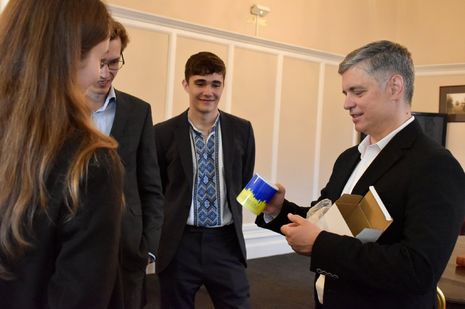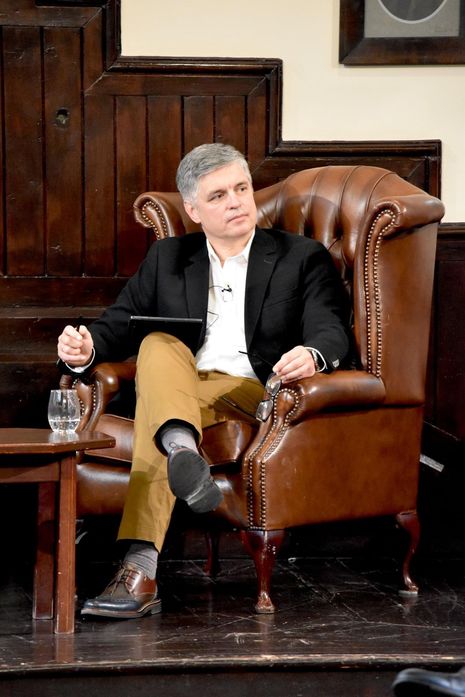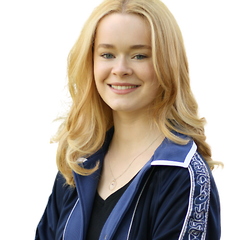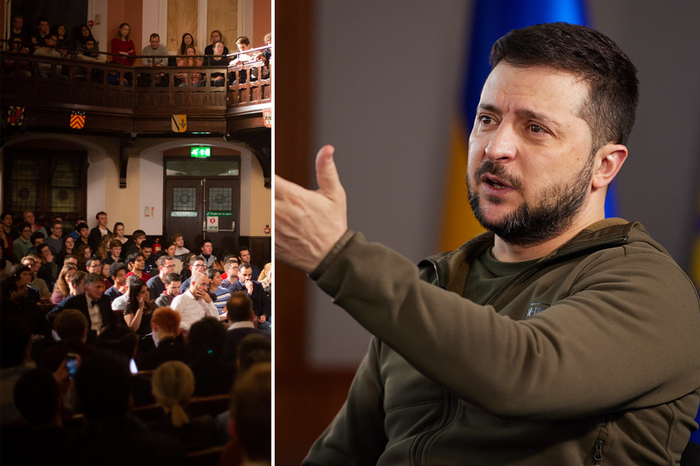The ambassador who brought Zelensky to Cambridge
The Ukrainian ambassador on Russian donors, the UK’s response, and how students can help

I’ll invite President Zelensky to speak at Cambridge University, a smiling Vadym Prystaiko tells a speechless Union chamber as he relaxes into a chair across from us; an interrogation from Varsity journalists is probably the Ukrainian ambassador’s easiest task since the war began.
Appointed ambassador to the UK by Zelensky on 20 July 2020, Prystaiko did not envisage the transformation in responsibilities his position would very quickly require. Yet despite the diplomatic precision behind each word, Vadym candidly admits the psychological toll of his job. “Even for us, as diplomats, who have access to this information, we’re always constantly checking our phones looking for what is going on, who’s been killed, who’s not, which city’s been bombed.”
In March (3/22), Prystaiko told a British select-committee that it was difficult for him to refer to his fellow Ukrainians as “refugees”. Has this changed as the war has progressed and more than 14 million Ukrainians have fled their homes? “We can’t imagine ourselves to be refugees. We’re attached to our land,” he explains. “Of these seven million [displaced] Ukrainians, one million are already back home…The mayor of Kiev is begging people not to come back here.”
“We can’t imagine ourselves to be refugees. We’re attached to our land”
He reminds me: “Don’t forget that most of the men back home are fighting. So most of the refugees are women and children. Two-thirds of them are kids. This is about getting them out as fast as possible.” The ambassador is accompanied by his wife and children, who stand watching shyly. It reminds me of the women and children left behind by war. No Ukrainian family has been left untouched by the conflict.
Prystaiko’s words are powerful, but many fear they’re falling on deaf ears. The British government has been heavily criticised for their Homes4Ukraine scheme which some have labelled a “scam”. Communication is said to be poor between those looking for homes and the people that can provide them, and some refugees were even reported “essentially homeless” after being kicked out by sponsorship hosts.
Yet despite this, Prystaiko emphasises his appreciation for the UK’s support. “At least it is a scheme”, he says. “Yes, it is laborious, yes it is difficult, yes it is overly bureaucratic, but there are so many cases which we can’t tell the public about when these precautions have actually saved people.”
Does he feel ‘Partygate’ and Boris Johnson’s leadership affects the UK’s ability to respond to the crisis? He laughs. To him, Johnson and the internal squabbles at Westminster are small fry in comparison to Vladimir Putin.
But what about the accusations of Russian donors funding the Conservative Party? Ian Blackford, the SNP’s Westminster leader, claimed that the Conservatives had taken £2.3 million “from Russian oligarchs”. But even to this, Prystaiko believes Britain is “on the right track”.

“If you want to learn from somebody with a bad experience of allowing in Russian dirty money, talk to us”, he adds ruefully. “We created a whole class of oligarchs, corrupt people, just because we allowed all this to be so connected, so attached to this money.” He has more faith in Britain’s ability to cleanse themselves of Russian money. “Parliament is going all hands-on. This is a very healthy discussion. I believe that it will come and you will clear out all of it, painfully.”
Prystaiko, probably not for the first time in his career, tactfully avoids being drawn into political debates. He diplomatically expresses his gratitude for the West’s assistance to Ukraine whether it be the sending of missiles or their recent Eurovision contest win, but why does he believe Ukraine has received so much support?
“I was telling everybody we’d be fighting for each and every metre…not many people believed us, but now we’re doing it, and that’s why there is grace and popularity for the Ukrainians – because these people are paying for their lives and they’re doing it very professionally.”
When asked about the future of the conflict, Prystaiko can only consider a Ukrainian victory. He hopes for a Russian defeat “on the battlefield” and the justice that would be served afterwards. The importance that a Ukrainian triumph would have not just for his country but for wider society. “At the end of this, we will prosecute them. We will have to bring them to justice to make a statement. It’s never happened in our recent history, and now society is far from being a ‘21st century’ – we’re a different society. For all of us, not just Ukrainians, we can’t just let someone come in and allow his soldiers to kill everyone.”
Prystaiko feels this end to the conflict will bear importance for Russians too. “In Russian society, people don’t understand it. 82% of them supported Putin and his order to kill Ukrainians. Isn’t this crazy?”, he asks. “They have family members in Ukraine.”
Looking to the growing crowd of Ukrainian students waiting patiently to meet him, Prystaiko concludes by reassuring me of his confidence in the next generation. But he also recognises that for Ukrainian students separated from their families in Cambridge, this is an extremely difficult time. He calls for support from the student body, not just financial aid.
“Additional funds are probably a good idea because most of the parents cannot help their kids right now for obvious reasons. But psychological help and support is also very needed. I imagine for someone who has no parents and has not established good relations with new friends in new places, this is very difficult for these people. I believe any help, not just from the administration of the University, but from society, from the students, is very needed right now.”
He fondly recalls his time at university to the students, and the pride he has in his own education. “When I talk to great people at your university, each and every university can be proud of something. My own university was created by Igor Sikosky, the guy who pioneered helicopters. So I also, looking at you lot, am proud to be from there.”
He also has some lighter advice, saying while smiling through a grin: “And have a good time too.” Prystaiko’s reminder to enjoy time at university is an unspoken acknowledgement of the weight that will inevitably fall on young Ukrainian’s shoulders.
President Zelensky will be speaking to the Cambridge Union today (11/6) at 5pm.
 News / Hundreds of Cambridge academics demand vote on fate of vet course20 February 2026
News / Hundreds of Cambridge academics demand vote on fate of vet course20 February 2026 News / Judge Business School advisor resigns over Epstein and Andrew links18 February 2026
News / Judge Business School advisor resigns over Epstein and Andrew links18 February 2026 News / University Council rescinds University Centre membership20 February 2026
News / University Council rescinds University Centre membership20 February 2026 News / Petition demands University reverse decision on vegan menu20 February 2026
News / Petition demands University reverse decision on vegan menu20 February 2026 News / Caius students fail to pass Pride flag proposal20 February 2026
News / Caius students fail to pass Pride flag proposal20 February 2026












